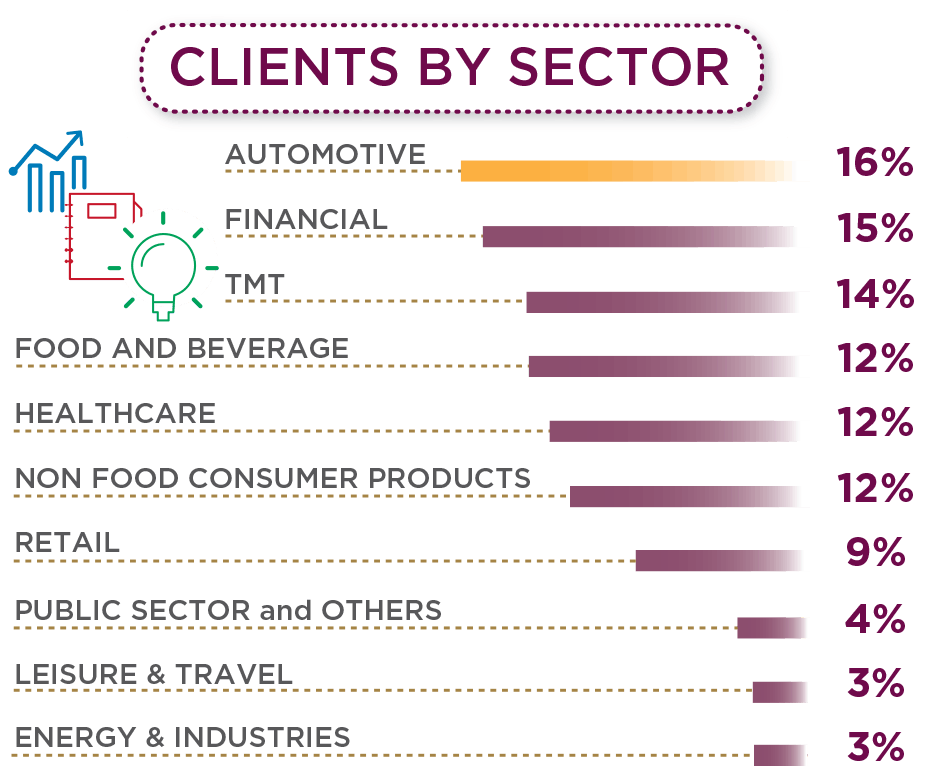/ Benchmarks on the Groupe’s clients
Based on 3,574 clients representing 91% of the Groupe’s total net revenue (see Section 1.3.4 of this document), the breakdown of client business sectors/industries was well balanced, as has been so for several years now.

CLIENTS BY SECTOR
AUTOMOTIVE 16%
FINANCIAL : 15%
TMT : 14%
FOOD AND BEVERAGE : 12%
HEALTHCARE : 12%
NON FOOD CONSUMER PRODUCTS : 12%
RETAIL : 9%
PUBLIC SECTOR and OTHERS : 4%
LEISURE & TRAVEL : 3%
ENERGY & INDUSTRIES : 3%
The top 100 clients represent 56% of annual revenue (see chapter 6, note 29 in this document).
In 2021, 150 clients asked Publicis Groupe to produce an external CSR assessment (Ecovadis or other).
Responsible consumption: listening to our clients’ customers
Social and environmental justice issues are at the heart of citizens’ concerns, and the pandemic context has sharply highlighted the imbalances in society in all countries. More than ever, the expectations of citizen-consumers highlight aspirations in favor of more responsible (concrete commitments of brands and companies in social and environmental matters), transparent (on raw materials, origins, manufacturing processes, etc.), sustainable (repairability, exchange, rental, etc.) and affordable consumption. The issue of price remains central in a context of economic and social crisis. With the accelerated digitization of the last two years, purchasing behavior has changed very quickly in all sectors.
Attentive social and societal listening to the needs and expectations expressed is central to the Groupe’s business lines. This is also what determines the commitment of the Groupe’s agencies to the principle of free will and free choice, which must be respected in the design and production of communications, in order to avoid the intrusive nature of advertising.
Regarding education Publicis Groupe has, for over 10 years now, participated in MediaSmart, a European program (PubMalin in France, designed to help primary school teachers teach 8-11 years old critical thinking skills relative to advertising, as part of a joint initiative with media representatives, teachers, consumer associations and regulatory authorities. The Groupe also participates in the MediaSmart Plus program aimed at high-school students and their teachers.
4.2.2 Responsible Marketing: Publicis Groupe’s unique approach
4.2.2.1 Groupe policy
Responsible Marketing is based on key principles to be applied in any communication project: truth, decency, respect, honesty, societal responsibility. This must be translated into the form and the substance of the messages, while preserving a maximum amount of creativity. Publicis Groupe’s professional standards in terms of responsible marketing are based on a set of voluntary rules, some of which are specific to the Company and others are defined by professionals in forums open to stakeholders, in a logic of co-operation. Since 2009, Publicis Groupe has taken a position, formalized in an internal note from the CEO, on the fight against greenwashing, in the name of honesty and respect for clients, and to avoid any damage to the brands entrusted to us. With a view to constant improvement, the Groupe reviews its general responsible marketing policy each year, which is a public document accessible in the CSR Smart data section on It is important to Groupe agencies, in their recommendations formulated to clients, that citizen-consumers are always able to exercise their free will and make informed choices, thanks to transparent communication that is not intrusive.
In this digital world, another principle is essential: the possibility for everyone to have control of their data and to be able to exercise the rights granted by the applicable regulations. This principle guides the technological choices and solutions offered to clients, so that the end user, client or visitor, has real control over their data. All end-users must be able to access, rectify or delete their own data, and even easily exercise their right to be forgotten.
